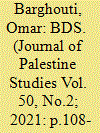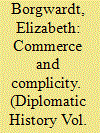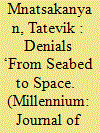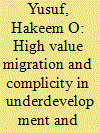|
|
|
Sort Order |
|
|
|
Items / Page
|
|
|
|
|
|
|
| Srl | Item |
| 1 |
ID:
178795


|
|
|
|
|
| Summary/Abstract |
Despite its military, diplomatic, and economic power, Israel’s regime of military occupation, settler colonialism, and apartheid still views the nonviolent, Palestinian-led global Boycott, Divestment, Sanctions (BDS) movement as a “strategic threat” to its system of injustice, waging a protracted war against the movement accordingly. This essay aims to contextualize Israel’s war on BDS by examining the movement’s origins, principles, impact, and theory of change. It analyzes the most critical challenges BDS is facing and its most promising strengths, especially its balancing of ethical principles with strategic effectiveness and its intersectional approach to the struggle for Palestinian freedom, justice, and equality.
|
|
|
|
|
|
|
|
|
|
|
|
|
|
|
|
| 2 |
ID:
098257


|
|
|
| 3 |
ID:
184133


|
|
|
|
|
| Summary/Abstract |
Despite critiques of denials broadly underlying Critical International Relations deconstructions of state, security and subjectivity, there is little explicit exploration of the ontological status of denial, and how denials operate in the politics of (in)security. Animated by the question, why and how web of actors and interests traversing the public and private spheres involved in the provision of security endure despite long-running critique, this article problematises = denials. An explicit theorisation of denial needs to be put centre stage in the study of security. Drawing on Dillon’s theorisation of the unstable duality of (in)security and synthesising it with a Deleuze and Guattarian assemblage approach, it theorises denial in two forms – denial of complicity and denial of the impossibility of security – as ontologically necessary for the politics of (in)security; then proposes that we scrutinise and expose assemblages of (in)security. These assemblages form, endure and expand, by thriving on denials of the impossibility of security and its attendant complicities; forming symbioses of denial traversing the public-private realms. Assemblages of (in)security adapt, expand, and propagate new technologies of (in)security, often ironically by responding to demands from critique. Without an assemblage-based thinking, we are methodologically ill-equipped to trace, expose and critique the politics of (in)security, without unwittingly partaking in denials sustaining it.
|
|
|
|
|
|
|
|
|
|
|
|
|
|
|
|
| 4 |
ID:
116885


|
|
|
|
|
| Publication |
2012.
|
| Summary/Abstract |
Through a focus on the UK's 'High Value Migrants' programme, this article directs attention to how commercial migration laws and policies of developed countries could negatively affect the global South. Drawing mainly on insights from criminology and development studies, it investigates how the commercial migration laws and policies, specifically the aspects that deal with encouraging or attracting 'high-value' foreign entrepreneurs and investors, make the state potentially complicit in corruption and underdevelopment in the global South. There is an important need to address the implicated migration laws and policies as a critical and integral part of international efforts to combat corruption and promote peace and development in the global South. Reform of such laws and policies is in the long-term interest of all stakeholders.
|
|
|
|
|
|
|
|
|
|
|
|
|
|
|
|
|
|
|
|
|